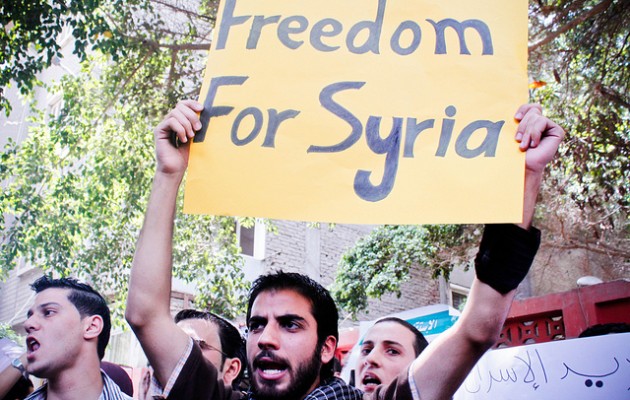By Robin Yassin-Kassab
In August 2012 Egyptian President Muhammad Morsi attended a meeting of the Non-Aligned Movement (NAM) in Tehran. His presence at the conference was something of a diplomatic victory for the Iranian leadership, whose relations with Egypt, the pivotal Arab state, had been at the lowest of ebbs since the 1979 revolution.
Egypt’s President Sadat laid on a state funeral for the exiled Iranian shah. A Tehran street was later named after Khalid Islambouli, one of Sadat’s assassins. Like every Arab country except Syria, Egypt backed Iraq against Iran in the First Gulf War. Later, Hosni Mubarak opposed Iranian influence in Iraq, Syria, Lebanon and Palestine, worked with the US and Saudi Arabia against Iran’s nuclear program, and was one of the Arab dictators (alongside the Abdullahs of Jordan and Saudi Arabia) to warn darkly of a rising “Shi’ite cresent”. Not surprisingly, Iran was so overjoyed by the 2011 revolution in Egypt that it portrayed it as a replay of its own Islamic Revolution.
Iran also rhetorically supported the revolutions in Tunisia and Libya, the uprising in Yemen, and, most fervently, the uprising in Shia-majority Bahrain.
In Syria, however, Iran supported the Assad tyranny against a popular revolution even as Assad escalated repression from gunfire and torture to aerial bombardment and missile strikes. Iran provided Assad with a propaganda smokescreen, injections of money to keep regime militias afloat, arms and ammunition, military training, and tactical advice, particularly on neutralising cyber opponents. Many Syrians believe Iranian officers are also fighting on the ground.
Iran’s backing for al-Assad is ironic because at a certain point the Syrian revolution was the one that most resembled 1979 in Iran – the violent repression of demonstrations leading to angry funerals leading to still more in a constantly expanding circle of anger and defiance; the people chanting allahu akbar from their balconies at night; women in hijabs joining women with bouffant hair to protest against regime brutality.
It was also a massive miscalculation, a lesser cousin to the miscalculations made by Bashaar al-Assad, and one which stripped the Islamic Republic of the last shreds of its revolutionary legitimacy. Like the Syrian president, Iran was popular among Syrians until twenty two months ago, even among many sectarian-minded Sunnis. (So too was Hizbullah, now widely reviled. In 2006, the Syrian people – not the regime – welcomed into their homes a million south Lebanese refugees from Israeli bombing.) It now seems very unlikely that any post-Assad dispensation in Syria will want to preserve Iranian influence. The Free Syrian Army, the anti-Assad Islamist militias, and the Syrian National Coalition all see Iran as an enemy of Syria, not as an honest broker that could help negotiate a transition.
Iranian popularity has also collapsed in the wider Arab world, where its pro-Assad policy has undercut its position more effectively than American or Israeli messaging could ever have done. (James Zogby’s poll was conducted in June 2011, too early for revulsion over Syria to have fully developed, but it nevertheless shows a dramatic decrease in favourable attitudes to Iran.)
Back in August, President Morsi (whose foreign policy has been much more intelligent than his domestic governance) chastised his hosts on the Syrian issue. “We should all express our full support to the struggle of those who are demanding freedom and justice in Syria,” he said, “and translate our sympathies into a clear political vision that supports peaceful transfer to a democratic system.” The Iranian leadership was embarrassed enough to censor this part of Morsi’s speech from its state TV broadcasts.
Morsi also offered the Iranians the following deal: Egypt would develop a warm economic and political relationship with Iran to the extent of championing Iran’s nuclear energy program and opposing sanctions in the international fora. In return, Iran would pull back from its support of the Assad regime.
By its continued support for Assad, Iran in effect rejected the deal. Nevertheless, Morsi set up a four nation contact group – Egypt, Turkey, Saudi Arabia and Iran – which has foundered not only on Iranian intransigence but also on Saudi absences from meetings. (Saudi Arabia has offered rhetorical support and some light weapons to the Syrian resistance; it also sent troops to Bahrain to help put down the democratic uprising there.) Egyptian-Iranian consultations on Syria continue.
Morsi was actually offering something substantial to the Iranians. It’s difficult to see how negotiations involving the Americans could produce better results so long as the US, bound up as it is with Israel’s self-perceived interests in the region, insists on sanctioning Iran’s nuclear program.
This is a great shame. Alongside Russia, Iran is the only power to exert any real influence on Bashaar al-Assad. It is to be hoped that, as the fall of the Assad regime becomes more apparent, wisdom will eventually prevail in Tehran. A volte face even at this late stage would strengthen Iran in its battles with the West and would temper rising anti-Shia sentiment in Syria and the wider Arab World.
– Robin Yassin-Kassab is the author of The Road From Damascus, a novel, co-editor of the Critical Muslim, a quarterly journal which looks like a book, and of www.pulsemedia.org. He blogs at www.qunfuz.com.





